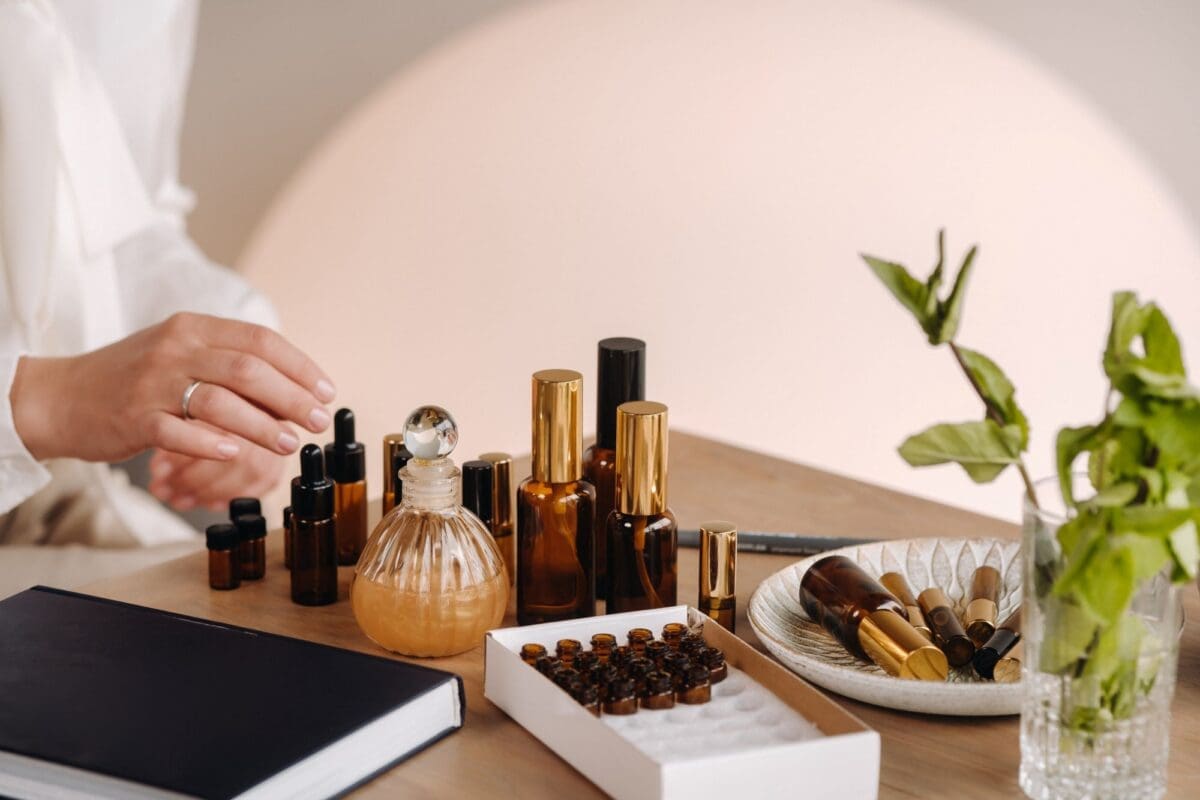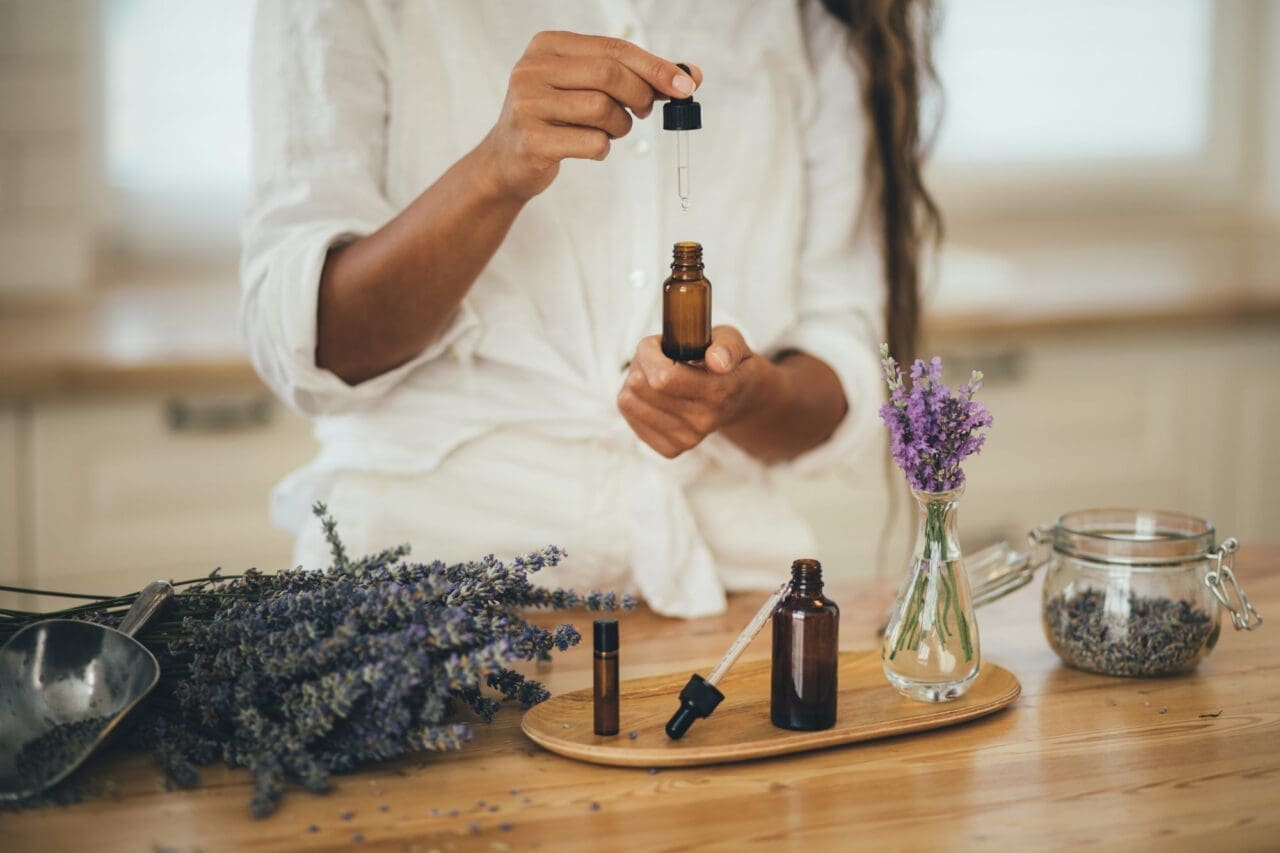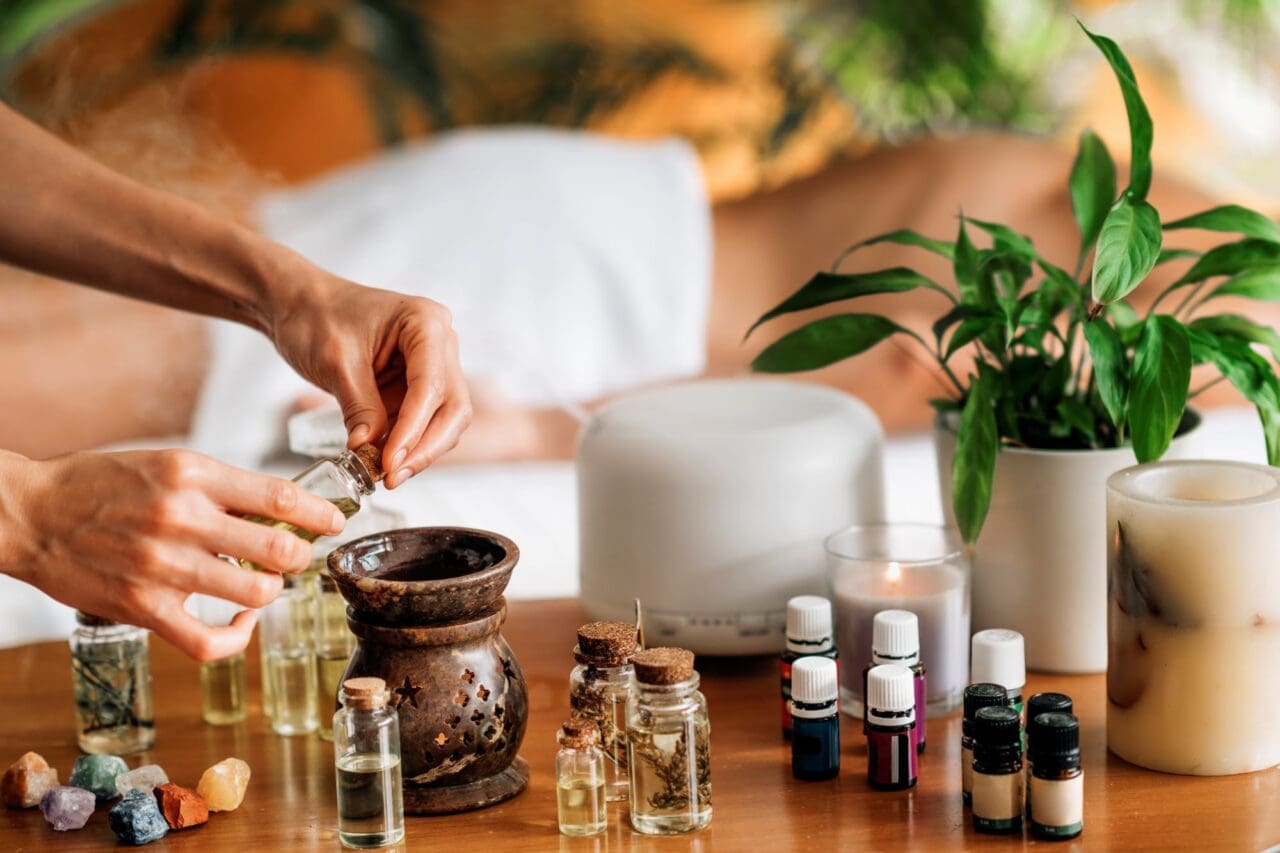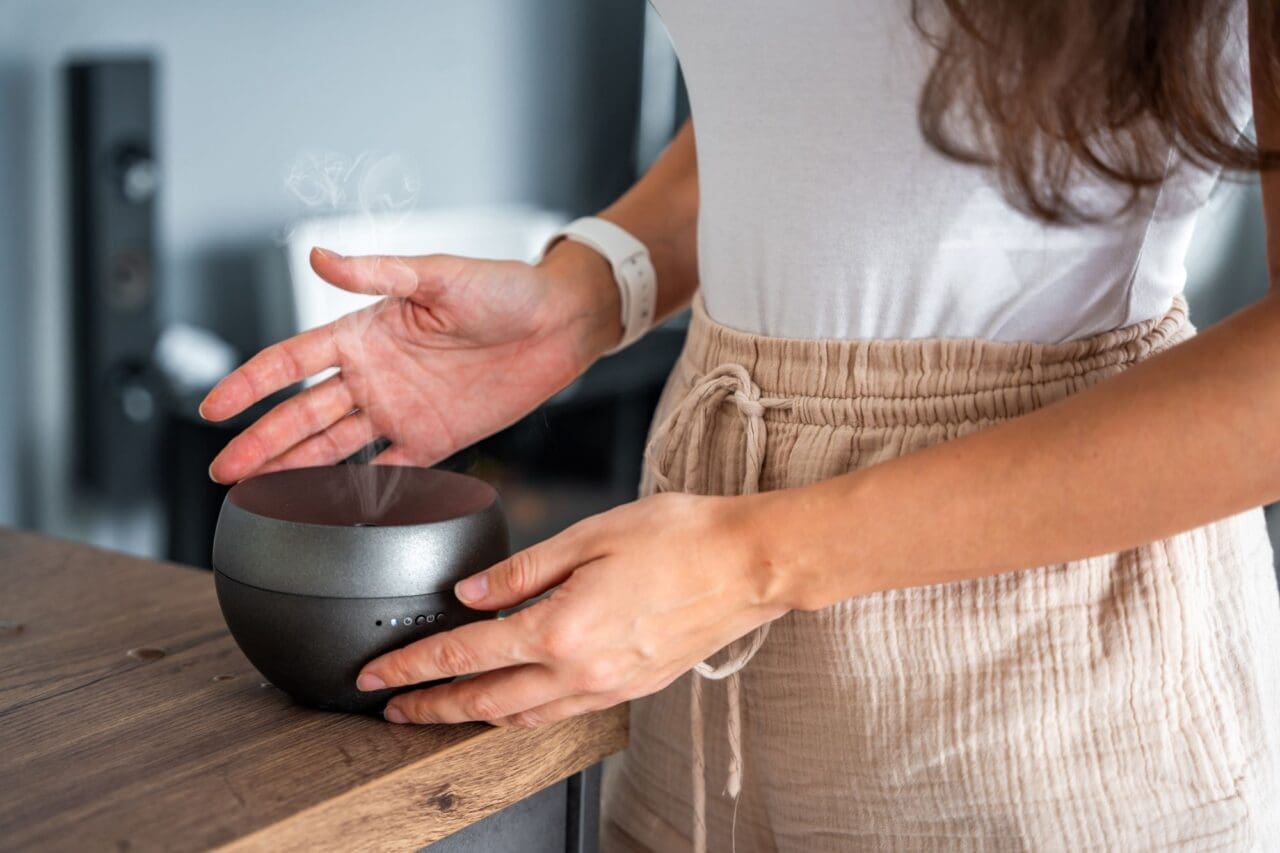Essential Oils 101: Types and When To Use Them

Ever walk into a spa and instantly feel calmer? Or maybe a burst of citrusy sunshine perks you right up? Those amazing scents are likely thanks to essential oils! Extracted from the very essence of plants, these concentrated liquids have been used for centuries to enhance well-being.
The best part? You can harness that power to create a delightful atmosphere in your own home. From relaxation to rejuvenation, keep reading to discover the world of essential oils and how they can transform your space.
Related reads to check out!
The Best Reed For Your DIY Reed Diffuser
Top 7 Signs That You Need a Humidifier In Your Home
Air Purifier Vs. Humidifier; Which One is Best For You
Essential Oils 101: What Are Essential Oils?
Essential oils are far more than just pleasant scents; these potent botanical extracts are nature’s own concentrate, embodying the essence of their source, whether it be a flower, leaf, bark, or root. Each oil captures a plant’s flavor, scent, and, most importantly, its therapeutic properties, all in a single drop.
But where do they come from? Here is a short crash course about essential oils.
Extraction Methods
The journey to extracting essential oils is a careful and meticulous process, pivotal in preserving their aromatic and therapeutic qualities. Two of the most common methods are:
- Distillation – this is the most prevalent method, especially for extracting oils from flowers and leaves like lavender and peppermint. Through steam distillation, steam is passed through plant materials, vaporizing the volatile compounds. These vapors are then condensed back into liquid form and collected as essential oils.
- Cold pressing – primarily used for citrus oils like lemon or orange, this mechanical method involves pressing the rind or peel under high pressure to extract the oils. It’s like wringing out the essence of the fruit, capturing its zesty soul without any heat which can degrade some of the delicate nuances.
Common Sources of Essential Oils
The beauty of essential oils lies in their diversity. Here are a few sources:
- Plants – eucalyptus oil comes from the distilled leaves of the eucalyptus tree, renowned for its clear, sharp aroma and respiratory benefits.
- Flowers – consider the classic lavender, sourced from the beautiful, tiny purple flowers, known for their calming and soothing properties.
- Roots – take vetiver, for instance, extracted from the dense, tangled roots, offering a complex earthy fragrance often used in aromatherapy for relaxation.

Types of Essential Oils and When To Use Them
There are numerous essential oil options to choose from, making it quite difficult for a beginner. The good news is that there is a way to narrow down your options.
The key thing is to identify the purpose, i.e., why do you need the essential oil? Is it for creating a calming mood or to help cleanse your environment? Here’s a guide to help you choose the best essential oils for your needs:
1. Calming Oils
Ah, the land of lavender fields and tranquil moments. When it comes to creating a serene atmosphere in your home, calming essential oils are your best friends. These fragrant oils boast properties that can help you unwind, de-stress, and drift off to sleep peacefully.
Lavender Essential Oil
This superstar of the calming oil world is beloved for a reason. Lavender oil’s scent is known to promote feelings of peace and tranquility.
Diffuse it in your bedroom before bedtime to ease your mind and encourage restful sleep. You can also add a few drops to a warm bath for a luxurious soak that melts away tension.
Chamomile Essential Oil
If you ever find yourself feeling wound up after a long day, chamomile oil is here to help. This gentle essential oil is renowned for its stress-reducing properties.
Create a peaceful ambiance by diffusing chamomile oil throughout your home, or consider incorporating it into a DIY massage oil for some self-care TLC.
Bergamot Essential Oil
Looking for a touch of citrusy calm? Bergamot oil offers a unique and uplifting aroma that can ease anxiety and promote relaxation.
Diffuse it during meditation or while reading a book to create a tranquil environment.
Sandalwood Essential Oil
Earthy and grounding, sandalwood oil is another excellent choice for promoting relaxation. While research is ongoing, some studies suggest it may help ease feelings of anxiety.
Diffuse sandalwood oil in your living room to create a calming atmosphere, or add a drop (diluted, of course!) to your nighttime moisturizer for a touch of tranquility before bed.
2. Uplifting Oils
Need a midday pick-me-up or a burst of sunshine in a bottle? Look no further than uplifting essential oils! These invigorating scents can help boost your mood, sharpen your focus, and energize your space.
Peppermint Essential Oil
Ever felt your eyelids getting heavy after lunch? Peppermint oil is your knight in shining armor. This invigorating oil has a refreshing aroma that can help enhance alertness and concentration.
Feeling a midday slump? Diffuse peppermint oil in your workspace to sharpen your mind and keep you focused throughout the afternoon.
Citrus Oils Essential Oil
Get ready for a dose of sunshine! Citrus essential oils, like lemon and orange, are well-known for their mood-uplifting properties. Their bright, cheerful scents can create an energizing atmosphere that’s perfect for chasing away the blues.
Diffuse them in the morning for a citrusy burst that jumpstarts your day, or add a touch of sunshine to your cleaning routine with a homemade citrus-infused spray.
Rosemary Essential Oil
Are you feeling mentally sluggish? Rosemary oil is here to help! This stimulating oil is known for its potential cognitive benefits, and some studies suggest it may enhance focus and memory.
Diffuse rosemary oil while working on a project that requires concentration, or add a diluted drop (always dilute!) to your favorite hair oil for a stimulating and invigorating experience.
Grapefruit Essential Oil
Uplifting and invigorating, grapefruit oil offers a unique citrusy scent that can promote feelings of optimism and energy.
Diffuse it in your kitchen while whipping up a healthy meal, or add a touch (diluted, of course!) to your body lotion for a refreshing and uplifting start to your day.
3. Cleansing Oils
Looking to freshen up your home environment and promote a sense of purification? Cleansing essential oils are your allies! These beneficial oils boast properties that can help eliminate unwanted odors and create a clean-feeling atmosphere.
Tea Tree Essential Oil
If you’re after a powerhouse for skin health, tea tree oil is a standout. Known for its antiseptic properties, it’s great for treating skin blemishes and improving overall skin clarity.
Apply it topically in a diluted form to affected areas, or add it to your skincare products for an extra purifying effect.
Eucalyptus Essential Oil
When it comes to respiratory health, eucalyptus oil is your respiratory system’s friend. Its crisp, stimulating scent helps to clear the airways and can provide relief from colds and allergies.
Diffuse eucalyptus oil in your bathroom to create a spa-like atmosphere, or add a diluted drop (remember, dilution is key!) to a DIY steam treatment for a refreshing and potentially decongesting experience.
Lemon Essential Oil
A natural deodorizer, lemon essential oil offers a bright, citrusy scent that can help eliminate unwanted odors.
Diffuse lemon oil in your kitchen after cooking to neutralize lingering food smells, or add a few drops (diluted!) to your homemade floor cleaner for a refreshing and potentially antibacterial cleaning boost.
Lemongrass Essential Oil
Lemongrass oil boasts a clean, herbaceous aroma that can help purify the air. Similar to lemon oil, it may offer some deodorizing properties.
Diffuse lemongrass oil in your living room to freshen the air, or consider adding a diluted drop (dilution is crucial!) to your laundry detergent for a touch of natural cleansing and a refreshing scent.

How to Choose the Right Essential Oil
Choosing the right essential oil might feel like a stroll through a fragrant maze. Here are some key tips to help you navigate your options and pick the essential oils that will best meet your needs and enhance your well-being:
Identify Your Needs
First things first, pinpoint what you need the essential oil for. Are you looking for stress relief, an energy boost, skincare, or perhaps a natural cleaning solution? Different oils serve different purposes, so identifying your primary need will help you narrow down your choices.
To do this, consider the oil properties:
- For relaxation – lavender and chamomile are renowned for their calming effects.
- For energy and focus – peppermint and eucalyptus can invigorate your senses and help you stay alert.
- For skin care – tea tree oil is excellent for its antiseptic properties, while frankincense oil is prized for its ability to rejuvenate the skin.
- For natural home cleaning – lemon and orange oils are not only refreshing but also have strong cleansing properties.
Quality Matters
When selecting an essential oil, quality should never be compromised. Look for oils that are 100% pure, organic, and free from any additives or synthetic ingredients.
Reputable brands will often provide information about the oil’s botanical name, country of origin, and extraction method, which are good indicators of purity and quality.
Packaging and Storage
High-quality essential oils come in dark glass bottles to protect them from light, which can degrade their quality over time. Ensure the packaging is secure and that the oil is stored properly—away from direct sunlight, heat, and humidity—to maintain its efficacy.
Budget Considerations
While it’s tempting to go for cheaper options, remember that with essential oils, you often get what you pay for. Investing in a slightly more expensive oil that is pure and potent means you’ll need to use less of it each time, making it more cost-effective in the long run.

How to Use Essential Oils Safely
While essential oils are amazing tools for enhancing your home environment, it’s important to use them safely and effectively. Here’s what you need to know:
Dilution is Key
Essential oils are highly concentrated, and using them directly on your skin can lead to irritation or allergic reactions. To safely apply them topically, always dilute essential oils with a carrier oil.
Suitable carrier oils include coconut, jojoba, or almond oil. A general rule of thumb is to maintain a dilution ratio of 1-2% essential oil, which translates to about 6-12 drops of essential oil per ounce of carrier oil.
Topical Application
Once diluted, you can apply the oil blend to areas like the wrists, temples, back of the neck, or the soles of your feet. These spots are ideal for absorption.
Always perform a patch test on a small area of skin first to ensure there’s no adverse reaction.
Inhalation
Using a diffuser is a popular way to enjoy essential oils aromatically. Add a few drops of your chosen essential oil to the diffuser filled with water, and let it disperse the oil into the air.
Alternatively, you can inhale the oil’s vapors directly by sniffing it from the bottle or by placing a few drops on a cloth or tissue.
Diffusers Are Your Friend
Diffusers are a fantastic way to fill your home with the beautiful aromas of essential oils. They work by nebulizing the oil particles, creating a fragrant mist that gently disperses throughout the room. When using a diffuser, follow the manufacturer’s instructions for proper use and dilution ratios.
Besides a diffuser, you can use other alternative methods. These include
- Bath salts – add a few drops of diluted essential oil (diluted in carrier oil!) to your bath salts for a relaxing or invigorating soak.
- Homemade cleaning sprays – looking for a natural cleaning boost? Add a few drops of diluted essential oil (like lemon or tea tree) to your homemade cleaning spray recipe. Remember, always dilute and test the solution on a small inconspicuous area first.
Safety First
Finally, it’s important to practice safety when handling essential oils. And dilution isn’t the only safety practice to keep in mind. Here are other safety measures you need to implement:
- Avoid contact with eyes and mucous membranes – essential oils are potent and can irritate sensitive areas.
- Do a patch test for skin sensitivity – apply a diluted drop of the essential oil to a small area of your forearm and wait 24 hours to see if there’s any reaction.
- Keep essential oils out of reach of children and pets.
- If you are pregnant, breastfeeding, or have any medical concerns, consult with your doctor before using essential oils.
Final Word
The world of essential oils offers a treasure trove of delightful scents and potential benefits for your home environment. From creating a calming sanctuary to promoting a refreshing and invigorating atmosphere, these versatile oils can add a touch of well-being to your everyday life.
Remember, the key to enjoying essential oils is understanding their properties and how they can best serve your specific needs, whether it’s for relaxation, enhancing focus, skincare, or even green cleaning. By choosing high-quality oils and using them responsibly, you ensure that every drop provides the maximum benefit.
FAQ
Can essential oils be used directly on the skin?
It’s important to never use essential oils directly on your skin without diluting them first. These oils are highly concentrated and can cause irritation or allergic reactions. Always mix them with a carrier oil like coconut, jojoba, or almond oil before topical application.
How many drops of essential oil should I use in a diffuser?
A little goes a long way! Typically, 3-5 drops per 100 ml of water is sufficient, but this can vary depending on the size of the room and the type of oil used. Start with fewer drops and increase as needed based on your scent preference and the oil’s potency.
How long do essential oils last once opened?
Essential oils typically have a shelf life of 1 to 3 years, depending on the oil type. Citrus oils generally have a shorter life span, about 1-2 years. To extend their life, store your oils in a cool, dark place and make sure the caps are tightly sealed after each use.
